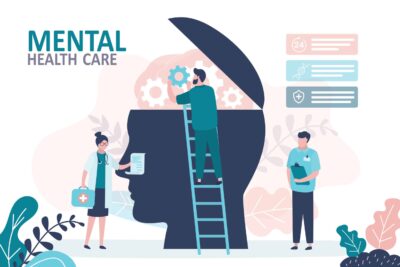
“Unfortunately, finding the right therapist and treatment isn’t always easy, especially if you’re at an emotional low point,” according to a Real Simple article. “Google ‘psychotherapy’ and you’ll find a confusing alphabet soup of acronyms – ACT, CBT, and DBT, to name a few – for the various types of treatments.”
However, there is good news: “If you do see a qualified therapist, chances are you’ll find it helpful,” according to the article.
Learning more about the types of mental health professionals that might be available to you can help you choose one that’s a good fit for your needs. First, it is important to understand the differences between a psychologist vs. psychiatrist.
Educational Background
Two common types of mental health professionals are psychiatrists and psychologists. While their titles sound similar and some people may use them interchangeably, these professionals typically have different types of education, training, and approaches to care.
Psychiatrists
According to the Mayo Clinic website, “A psychiatrist is a physician — doctor of medicine (M.D.) or doctor of osteopathic medicine (D.O.) — who specializes in mental health. This type of doctor may further specialize in areas such as child and adolescent, geriatric, or addiction psychiatry.”

“Your psychiatrist will start by asking questions to get more information about your mental health symptoms,” according to a Healthline article. “Depending on your symptoms, they might use psychological evaluations or recommend certain lab tests to find the right diagnosis.”
Why do lab tests when conditions like anxiety, depression, ADHD and other psychiatric tests can’t be diagnosed using a medical test like a blood draw or scan? The lab tests are often done to rule out other medical causes of symptoms that may be common in both psychiatric and physical illnesses. For example, sleeping too much or lethargy can be common symptoms of depression, but these are also symptoms of many other physical illnesses.
However, it is important to note that mental health conditions like depression, anxiety and ADHD can co-occur with other ailments, so a psychiatrist may work with another healthcare provider to determine if additional treatments are needed.
Psychiatrists, unlike psychologists or therapists, can prescribe medications for mental health disorders. As a medical doctor, a psychiatrist may or may not be your main point of contact during the course of your mental health treatment, depending on your condition and co-occurring illnesses.
Treatment from a psychiatrist may be helpful for those who struggle with significant mental health disorders that impact their daily lives.
“For most common conditions like anxiety disorders and depressive disorders, there is a significant proportion of the population that get better in 12 to 16 weeks,” Dr. Maria Oquendo, a professor and chair of psychiatry at the Perelman School of Medicine at the University of Pennsylvania and president of the American Foundation for Suicide Prevention tells U.S. News and World Report. “That’s not instantaneous, and it also requires that the person actively participate in the treatment: You’re going to get homework, and you’re going to have to do it.”
Psychologists
Psychologists, meanwhile, are not medical doctors. However, they often have a Psy.D. or a Ph.D., master’s or bachelor’s degree in psychology.
According to the American Psychological Association’s website:
“Practicing psychologists help a wide variety of people and can treat many kinds of problems. Some people may talk to a psychologist because they have felt depressed, angry, or anxious for a long time. Or, they want help for a chronic condition that is interfering with their lives or physical health. Others may have short-term problems they want help navigating, such as feeling overwhelmed by a new job or grieving the death of a family member.
“Psychologists can help people learn to cope with stressful situations, overcome addictions, manage their chronic illnesses, and tests and assessments that can help diagnose a condition or tell more about the way a person thinks, feels, and behaves.”
Treatment Differences
Psychiatrists and psychologists often work in similar settings; in fact, some may share a practice or exchange referrals. Yet, psychiatrists and psychologists often have different approaches to diagnosis and treatment for their patients’ mental health concerns.
“Psychiatrists and psychologists work in many of the same healthcare settings: private practices, clinics, rehabilitation programs, schools, and more,” according to a Healthline article. “Psychologists treat mental health symptoms with talk therapy, providing a space to share emotional distress and mental health symptoms you experience, over a series of sessions. They can offer guidance and support with understanding these symptoms and teach coping skills to navigate them.”
Psychiatrists may review their patients’ symptoms more in the context of medical illnesses.
“When a patient has a complicated medical history, neurological problems, or is acutely ill and possibly in need of intensive treatment, a psychiatrist will be the best place to start,” says Katherine Brownlowe, a psychiatrist at Ohio State University’s Wexner Medical Center, in a VICE article.

“Compared to psychiatrists, psychologists tend to focus more on social, cultural, and environmental factors instead of biological ones. They help identify negative thought patterns and other areas of brain function that might affect your behavior and emotional health, along with key environmental or life stressors that also play a part.
“Often, psychologists use therapy to help address and treat mental health symptoms. They might also act as consultants with other healthcare professionals or study therapy approaches for treatment programs.”
Providers may offer various types of therapies for anxiety and depression depending on their unique specializations. You can learn more about the different types of therapies (including acronyms you may see while researching) on the Anxiety & Depression of America (ADAA) website.
Is a Psychiatrist Qualified to Prescribe Medication?
Yes, as medical doctors, psychiatrists are qualified to prescribe medication. Psychologists cannot prescribe medication unless they are licensed to do so in their particular state, according to the Mayo Clinic website.
Even if you see a provider who cannot prescribe medication, they may work or collaborate with a provider who can prescribe — or refer you to one who can — if it is appropriate for your condition.
“Most [talk] therapy providers aren’t allowed to prescribe medication. You’ll usually need to consult a psychiatrist (with an MD), your family doctor, a nurse practitioner, or your ob-gyn for medications like antidepressants. But your doctor should collaborate with your therapist to make sure you’re getting the most appropriate treatment. If you think you might benefit from medication, discuss it with your therapist. They can direct you to someone with prescribing authority,” according to the Real Simple article.
Medications a psychiatrist might prescribe include the following, according to Healthline:
- “antidepressants
- antipsychotic medications
- mood stabilizers
- stimulants
- sedatives
After you start taking the medication, they’ll monitor your symptoms to keep track of signs of improvement, along with any side effects you experience. Based on this information, they might change your dose or prescribe a different medication.”
A pharmacogenomic test, like the GeneSight® test, can inform a healthcare provider about how a person’s genes may impact how they respond to or metabolize certain medications. That could include, for example, which medications may require dose adjustments, be less likely to work or have an increased risk of side effects based on their genetic makeup.
The test must be ordered by a clinician who orders medication. The test is a simple cheek swab taken in their office or can be sent by your clinician to be taken in the convenience of your home.
How Should You Choose a Provider?
Choosing a provider – like a psychiatrist or psychologist – is an intensely personal decision. It may also be a difficult one, as not everyone immediately bonds with their first choice.
A good place to start may be with your primary care provider. You can share your mental health concerns with the clinician, who may ask you questions about the severity, duration, and type of symptoms. Many primary care providers can and do prescribe mental health medications.

“If you’re going through a difficult time or want to work on better understanding your thoughts and behaviors, a psychologist may be a good option. You might also prefer to consult a psychologist if you want to treat your symptoms with therapy rather than a combination of therapy and medication,” according to Healthline. “Just know they might recommend connecting with a psychiatrist if they believe your symptoms may not improve with therapy alone.”
Other kinds of providers focus on mental healthcare. Many have advanced degrees, such as master’s degrees, and extensive training. Some of these include psychiatric mental health nurses, physician assistants, licensed clinical social workers, and licensed professional counselors, according to the Mayo Clinic website.
If you’re looking for a therapist, Psychology Today offers a tool that allows you to filter your search in specific ways, such as only looking for psychiatrists or online providers.
The search process may feel overwhelming at times, especially given provider shortages. Some experts recommend taking the process one step at a time.
“Your best bet is to make a list,” says clinical psychologist Bethany Cook in PopSci.
A list should contain psychologists or psychiatrists who have the background you are looking for – including their education, skills and experience. You may also want to include criteria of psychiatrists or psychologists who match what you may be facing (e.g., specializing in life transitions, LGBTQ+ issues, women’s health, etc.).
Once the list is compiled, Cook suggests checking with your insurance company to determine who is in your network and your potential deductible. Cook also warned that some insurance companies will put a cap on how many times you can see a therapist for mental health, so knowing that information in advance can help both you and your clinician structure your care most appropriately.
While psychiatrists, psychologists and other mental health professionals often have unique educational backgrounds and approaches, they all share a similar goal: to help you feel well. If you run into a roadblock while searching for a provider, keep going. Help is out there, and your mental health is worth it.
For more information about this topic, please read these other articles from GeneSight:
https://genesight.com/patient-stories/i-finally-felt-hopeful-about-my-treatment-and-future/
https://genesight.com/blog/patient/what-does-clinical-depression-feel-like/
Our articles are for informational purposes only and are reviewed by our Medical Information team, which includes PharmDs, MDs, and PhDs. Do not make any changes to your current medications or dosing without consulting your healthcare provider.
The GeneSight test must be ordered by and used only in consultation with a healthcare provider who can prescribe medications. As with all genetic tests, the GeneSight test results have limitations and do not constitute medical advice. The test results are designed to be just one part of a larger, complete patient assessment, which would include proper diagnosis and consideration of your medical history, other medications you may be taking, your family history, and other factors.
If you are a healthcare provider and interested in learning more about the GeneSight test, please contact us at 855.891.9415. If you are a patient, please talk with your doctor to see if the GeneSight test may be helpful.








